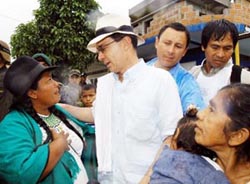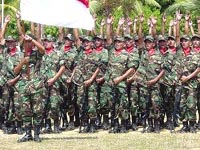U.S.
Military and Police Aid
- Focus on Arauca and Putumayo:Timeline
of Current Events Putumayo:
June
2003
June
29, 2003
 While
in Orito, President Uribe and Minister of Defense Marta Lucia
Ramirez unveiled the
While
in Orito, President Uribe and Minister of Defense Marta Lucia
Ramirez unveiled the  government's
new Security Strategy Document. In his remarks, Uribe addressed
the fumigation issue: "as long as I am president we will
not be suspending fumigations, I don't like to trick people. I
don't like to have one discourse here and another there. We are
going to defeat drugs any way we can, they have only brought violence
and problems to the Colombian people." [eltiempo.com
and AFP]
government's
new Security Strategy Document. In his remarks, Uribe addressed
the fumigation issue: "as long as I am president we will
not be suspending fumigations, I don't like to trick people. I
don't like to have one discourse here and another there. We are
going to defeat drugs any way we can, they have only brought violence
and problems to the Colombian people." [eltiempo.com
and AFP]
Link to the security strategy document in English: http://www.mindefensa.gov.co/politica/documentos/seguridad_democratica_eng.pdf
| President
Uribe also made initial payments to families who have joined
the "family forest protector" alternative development
program. This Plan Colombia-funded program requires families
to gradually replace their coca cultivation with legal crops
while protecting forests. Every two months indigenous and
peasant families will receive approximately US$300 for committing
themselves to reducing coca and preserving and protecting
the Amazon basin. [Associated Press] |
 |
June
24, 2003
 In
the municipalities of Orito and San Miguel the military engaged
in battle with the FARC; four members of the armed forces have
been killed and more than 10 wounded. [ElTiempo.com
con EFE]
In
the municipalities of Orito and San Miguel the military engaged
in battle with the FARC; four members of the armed forces have
been killed and more than 10 wounded. [ElTiempo.com
con EFE]
June 15, 2003
The FARC set off a number of bombs in Puerto Guzmán. The
most recent attack occurred when a family of workers opened the door to their home, and triggered
the explosion. According to news sources the rural areas of the
municipality resemble ghost towns, in the urban areas there are
few children playing and soldiers patrolling empty streets. The
mayor left town in March and can only visit by helicopter. Peasants
in rural Puerto Guzmán have two options, reports El Tiempo:
comply with the guerrillas' rules or leave. [Édison
Parra Garzón, El Tiempo]
family of workers opened the door to their home, and triggered
the explosion. According to news sources the rural areas of the
municipality resemble ghost towns, in the urban areas there are
few children playing and soldiers patrolling empty streets. The
mayor left town in March and can only visit by helicopter. Peasants
in rural Puerto Guzmán have two options, reports El Tiempo:
comply with the guerrillas' rules or leave. [Édison
Parra Garzón, El Tiempo]
June 9, 2003
 |
·
A number of Putumayo-based NGOs are pleased with the Defense
Ministry's decision to dismiss from duty Army General Gabriel
Ramón Díaz Ortiz, Commander of the Army's
2nd Division in the Department of Atlántico. Prior
to this posting, Gen. Díaz Ortiz was Commander of the
24th brigade in Putumayo, where allegations of human right
abuses and toleration of paramilitary activity led NGOs to
lodge complaints against him. |
June
8, 2003
A Los Angeles Times report found that the U.S.-backed program
to eliminate coca growth in Putumayo has for the most part succeeded.
However, the reporter also noted that U.S. and Colombian efforts
to promote alternative development programs have had less success.
"About 50,000 people have left Putumayo to grow and pick
coca in other areas of Colombia. In Nariño, a neighboring
province, coca cultivation has nearly doubled to 37,000 acres."
According
to the report, over the past year most alternative development
programs have been concentrated around Putumayo, but the fumigations
have forced many to plant coca in more remote areas. One of these
areas is Guaviare department to the north. This remote zone has
a large guerrilla presence and no infrastructure, making it almost
impossible to carry out development work. According to a U.S.
official, "Right now, the plan in Guaviare is just to spray
them. … We don't have any longer-term development plans."
[T. Christian Miller, Los Angles Times]
June
6, 2003

Guerrillas of the FARC's 48th front attacked the San Miguel police
station from a place known as "the Island" in the San
Miguel river that separates Colombia from Ecuador. The attacked
lasted four hours and injured seven policemen. [El
Diario del Sur]
|
280
new "peasant soldiers" were deployed to Puerto
Guzmán, Puerto Caicedo, Puerto Asís and La
Hormiga , several of which have never had a police presence.
According to the commander of the 24th brigade, General
Jorge Pineda Carvajal, this constitutes the second phase
of the government's deployment of peasant soldiers in the
region. The soldiers will be housed in refurbished residences,
which will act as military barracks. Under the first phase
of the program 180 soldiers were deployed in the areas of
Villagarzón, La Dorada, La Tagua, Sibundoy and Orito.
[El Diario del Sur]
|
 |
June
3, 2003
 Small
shop owners in Villagarzón emphatically rejected the accusations
of 24th
Small
shop owners in Villagarzón emphatically rejected the accusations
of 24th  Brigade
Commander General Jorge Pineda Carvajal, claiming they
support paramilitary groups in the area.
Brigade
Commander General Jorge Pineda Carvajal, claiming they
support paramilitary groups in the area.
During
a security council meeting, Milton Bravo Rojas, the mayor of Villagarzón,
alluded to the fact that paramilitary groups have once again made
a presence in the town, causing generalized fear and panic among
the population, especially within displaced communities who have
been coined as guerrilla informants. Mr. Bravo requested the armed
forces take immediate action and halt the paramilitary incursion
as quickly as possible.
Soon
after, Gen. Pineda apologized to the community for his comments
and ordered the Domingo Rico battalion put an end to the paramilitary
presence in the area. [El Diario del Sur]

 government's
new Security Strategy Document. In his remarks, Uribe addressed
the fumigation issue: "as long as I am president we will
not be suspending fumigations, I don't like to trick people. I
don't like to have one discourse here and another there. We are
going to defeat drugs any way we can, they have only brought violence
and problems to the Colombian people." [eltiempo.com
and AFP]
government's
new Security Strategy Document. In his remarks, Uribe addressed
the fumigation issue: "as long as I am president we will
not be suspending fumigations, I don't like to trick people. I
don't like to have one discourse here and another there. We are
going to defeat drugs any way we can, they have only brought violence
and problems to the Colombian people." [eltiempo.com
and AFP]

 Brigade
Commander General Jorge Pineda Carvajal, claiming they
support paramilitary groups in the area.
Brigade
Commander General Jorge Pineda Carvajal, claiming they
support paramilitary groups in the area.